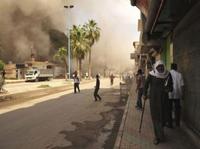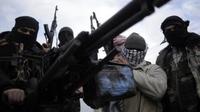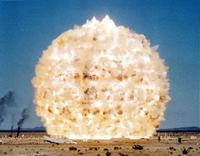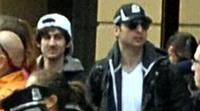-
U.S. sharply disputes UN official's claim that Syrian rebels used chemical weapons
The United States sharply challenged claims by a UN official – who is not a member of the UN investigative commission looking into to the possible use of chemical weapons in Syria – that the rebels, rather than the Assad regime, used sarin nerve gas near the city of Aleppo on 19 March. The UN investigative commission looking into the incident distanced itself from the official’s comments.
-
-
Heavy Israeli air strikes near Damascus destroy Iranian missile shipment to Hezbollah

Israel launched heavy airstrikes Friday and Sunday on a military base near Damascus, destroying shipments of sophisticated Iranian Fateh-110 missiles to Hezbollah. These were the second and third such strikes in as many months. Israel’s first strike on Syrian targets took place on 30 January. That strike destroyed advanced SA-17 surface-to-air missiles the Assad regime was trying to ship to Hezbollah on orders of Iran.
-
-
Chicago-area would-be terrorist to remain in jail

Last Friday a federal judge reversed the ruling of another judge and ordered that a Chicago-area teen accused of attempting to join al Qaeda-linked militants in Syria be kept in jail until his trail rather than be released to his family.
-
-
U.S. to keep Cuba on list of states sponsoring terrorism
The State Department said Wednesday that the Obama administration will not remove Cuba from the list of states sponsoring terrorism. Other countries on the list include Iran, Syria, and Sudan. The list is updated annually. Cuba sheltered Colombian and Basque terrorists, but with peace negotiations in Colombia, and with the Basque separatists announcing the end of their armed struggle, some analysts thought Cuba would be removed from the list this year.
-
-
House panel to hold hearings on marathon bombing
Representative Michael McCaul (R-Texas) said theHouse Homeland Security Committee will meet next week to hear testimony from Boston Police Commissioner Ed Davis and discuss the Boston Marathon bombing response methods and its implications for homeland security. “This will be the first in a series of hearings, as part of a broader investigation into the Boston Marathon bombings,” McCaul told reporters.
-
-
Woman who killed N.J. trooper in 1973 makes the FBI’s most wanted list
Joanne Chesimard, a former member of the Black Liberation Army who killed a New Jersey state trooper in 1973, has become the first woman to make the FBI’s most wanted list. The reward for her capture and arrest has doubled to $2 million. In 1979 Chesimard escaped jail, and since 1984 has been living in Cuba, using the name Assata Shakur.
-
-
Three of Dzhokhar’s friends charged with destroying evidence (Updated)

Three college students have been arrested on suspicion that they helped Dzhokhar Tsarnaev destroy evidence which would have provided details about his and his brother’s preparations for the marathon bombing. One of the three then lied to police when asked about their actions. The three are likely to face charges of conspiracy to obstruct justice. One of three will also be charged with lying to federal investigators.
-
-
Three friends of Dzhokhar arrested, charged with destroying evidence
Three college students have been arrested on suspicion that they helped Dzhokhar Tsarnaev destroy evidence which would have provided details about his and his brother’s preparations for the marathon bombing. One of the three then lied to police when asked about their actions. The three are likely to face charges of conspiracy to obstruct justice. One of three will also be charged with lying to federal investigators.
-
-
Canada considered deporting train terror suspect – but he was stateless
Raed Jaser, who is accused of planning an “al Qaeda supported” bomb attack aiming to derail a Canadian passenger train, was arrested nine years ago in Toronto and was facing deportation because he had a criminal record. Jaser is a Palestinian who grew up in the UAE. The UAE never gave his family a UAE citizenship, and they refused to take him back. The Canadian authorities say his case is not unique.
-
-
DHS chemical plant security program hobbled by problems, poor oversight
A DHS program responsible for the security of chemical facilities, such as the West Fertilizer Company plant in Texas, has been ineffective owing to a number of issues, leading federal investigators to wonder “whether it can achieve its mission, given the challenges the program continues to face.”
-
-
Female DNA found on Boston bomb fragments
FBI investigators found female DNA on fragments from the bombs used in the Marathon attack. The finding was first reported in the Wall Street Journal. Mikhail Allakhrdov, a man who some of Tsarnaev’s family members and friends described as the mysterious “Misha” who radicalized Tamerlan, said that he had not been in contact with Tsarnaev for several years, and that he never encouraged him to take up violence. Allakhrdov, a Ukrainian Christian who converted to Islam, admitted that a few years ago he was Tsarnaev’s “spiritual tutor.”
-
-
FBI looking for a “person of interest” who may have helped the Tsanaev brothers
Lawmakers with knowledge of the investigation into the Boston marathon bombing said over the weekend that law enforcement agencies are looking for a “person of interest” who may have been involved with the Tsarnaev brothers in preparing the attack. The lawmakers highlighted the fact that law enforcement agencies are not convinced that the brothers acted alone, without any help of one or two more people.
-
-
Jewish Security Summit discusses communal safety
Leaders from the Jewish Federations of North America (JFNA) and other Jewish organizations gathered last week at the first Jewish Communal Security Summit in New York to strategize with top experts in the field how best to keep the community safe.Security providers from around the country had a chance to learn about best practices in threat assessment and response in the current climate.
-
-
New fertilizer can be used to grow food – but not build bombs

Ammonium nitrate fertilizer is used in agriculture, but when mixed with a fuel such as diesel, it is highly explosive. It was used in about 65 percent of the 16,300 homemade IEDs in Afghanistan in 2012.About 1,900 troops were killed or wounded in IED attacks in 2012, 60 percent of American combat casualties. There have been more than 17,000 global IED incidents in 123 countries in the past two years. Timothy McVeigh used ammonium nitrate in Oklahoma City in 1995. Scientists have developed a fertilizer that helps plants grow but cannot detonate a bomb.
-
-
Tamerlan Tsarnaev's name was on U.S. terror watchlist since 2011

In March 2011, after being contacted by the Russian security services, the CIA added the name of Tamerlan Tsarnaev to the U.S. government’s terror watchlist. DHS secretary Janet Napolitano said that Tamerlan’s travel to Dagestan, and his arrival back in the United States, were “pinged” by the department. Leading lawmakers have raised questions about whether the U.S. intelligence community and law enforcement agencies have dropped the ball on the Tsarnaev brothers.
-
- All
- Regional
- Water
- Biometrics
- Borders/Immig
- Business
- Cybersecurity
- Detection
- Disasters
- Government
- Infrastructure
- International
- Public health
- Public Safety
- Communication interoperabillity
- Emergency services
- Emergency medical services
- Fire
- First response
- IEDs
- Law Enforcement
- Law Enforcement Technology
- Military technology
- Nonlethal weapons
- Nuclear weapons
- Personal protection equipment
- Police
- Notification /alert systems
- Situational awareness
- Weapons systems
- Sci-Tech
- Sector Reports
- Surveillance
- Transportation
Advertising & Marketing: advertise@newswirepubs.com
Editorial: editor@newswirepubs.com
General: info@newswirepubs.com
2010-2011 © News Wire Publications, LLC News Wire Publications, LLC
220 Old Country Road | Suite 200 | Mineola | New York | 11501
Permissions and Policies
Editorial: editor@newswirepubs.com
General: info@newswirepubs.com
2010-2011 © News Wire Publications, LLC News Wire Publications, LLC
220 Old Country Road | Suite 200 | Mineola | New York | 11501
Permissions and Policies
